Five former Olympians, Gabe Gardner, Chris Segesman, Misty May-Treanor, Staciana Stitts-Winfield and Michelle Venturella, reflect on their journey to the world’s biggest athletic arena, and how they continued to learn sports lessons as students of CUI’s Master's of Coaching and Athletics Administration program.
We are the Champions
Ask any athlete, at any level, be it high school, college or professional players and they will all likely tell you the same anecdote about achieving victory: the path is paved with sacrifice, blood, sweat and enough tears to fill an Olympic-sized pool. For the special group of sportsmen and women tenacious, talented and blessed enough to beat the odds and earn the honor of putting the coveted title of Olympian in front of their name, the road to the gold is that much more challenging – and equally rewarding.
With 121 medals won, and new American sports heroes crowned at the 2016 Rio Games—including “The Simones”, gymnast dynamo Simone Biles and history-making swimmer Simone Manuel, as well as the unstoppable swimming sensation that is 23-time-gold-medalist Michael Phelps—once again, the eyes of the world witnessed the best of the best compete.
As the next set of superstar competitors look ahead to the Tokyo 2020 Games, the CUI Master's of Coaching and Athletics Administration team thought it would be fitting to take a stroll down Olympic memory lane and chat with its star line up, five former Olympians who happen to also be alumni of the MCAA program.
Holding a collective six Olympic Gold medals among them across five sports, Gabe Gardner (Volleyball), Chris Segesman (Water Polo), Misty May-Traenor (Beach Volleyball), Staciana Stitts-Winfield (Swimming), and Michelle Venturella (Softball) shared memories about their sports beginnings, Olympic trials and triumphs, and the lessons they learned along the way. The champions also gave beyond-the-medal insight into how the MCAA program helped them continue their athletic careers from the other side of the game – as coaches.
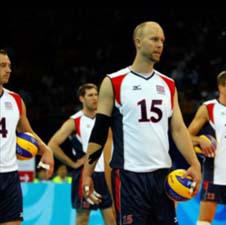
A Childhood Dream
Gabe Gardner’s dream of becoming an Olympian began long before he could tower over the top of a volleyball net. “I was 8 years old when the 1984 Olympics came to Los Angeles,” recalls Gardner. I had a high regard for this ideal that you can go and be one of the best in your sport in the entire country and possibly represent your country at a worldwide event that everybody admired and respected.”
A three-sport-athlete in high school, while Gardner excelled at basketball and water polo, he says volleyball was the far and away winner in his eyes. “Volleyball seemed to have the most long-term prospects of providing an opportunity to play in the Olympic Games or going on to a level that would make a long term career possible from playing professionally.”
Before making his first USA Men’s Volleyball Olympic team for the 2004 Athens Games, followed up by the 2008 Beijing Games—where he would win the team gold—Gardner played professionally overseas; 12 countries in 12 years overall. While the time abroad helped sharpen his skills, he admits that there were times when he experienced spikes of self-doubt.
“A lot of people in sports give up before they know if they’re going to make a team,” notes Gardner. “I didn’t have a great college career leading up to the Games, and then when I finally persisted long enough, I knew I had it inside of me. I believed in myself enough that when I got there, I was like yeah, I deserve this. This is where I belong.”
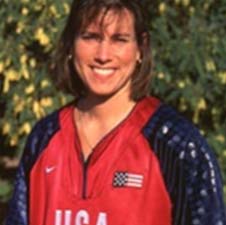
Catching History
In the years leading up to her debut at the Games, second guessing was also an unlikely opponent for softball Olympian Michelle Venturella. Like Gardner, Venturella was a standout high school athlete, leading her team to back-to-back titles as a first baseman. Once at Indiana University at Bloomington, she was thrown for a loop. “The coach asked me if I would try catching, although I never caught a day in my life,” says Venturella, now Head Softball Coach at Washington University in St. Louis.
Uncertain and uncomfortable at first, the switch would serve to alter Venturella’s position on the team, and later, softball history. A year later, her team won the Big 10 Conference, providing notoriety for the school and Venturella, in the form of the first-ever Olympic softball team tryouts for the 1996 Atlanta Games. “The timing of it for my career was great,” she says.
Adds Venturella, “I ended up filling out an application and sent in $25 to go through the process.” The only reason I tried out was because I wanted to put myself up against the best and see where I fit. Turns out, Venturella fit in perfectly, earning an alternate spot for the ’96 Games, and later, sliding into the Top 15 for the 2000 Sydney Games, where she won a gold medal.
“When I was on the Olympic team, I was more of a role player and it was great because I still got to be a part of something tremendous.” There’s nothing like putting on the uniform and having USA across your chest,” says Venturella. “It’s so humbling.”
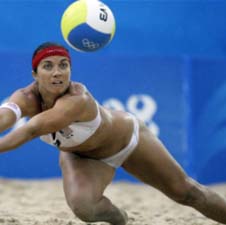
Hit the Sand Winning*
USA Beach Volleyball champion Misty May-Treanor has had sand between her toes since she was a teenager. May-Treanor grew up playing beach volleyball at the Santa Monica Pier outside of Los Angeles. She was an indoor volleyball champion at Newport Harbor High School and Cal State Long Beach before switching to sand in 1999.
The change shifted her career and made way for May-Treanor to reign supreme in the sport, playing well enough to compete in the 2000 Olympics with then-teammate Holly McPeak, finishing fifth.
But it was her partnership with Kerrie Walsh Jennings that made May-Traenor the face of beach volleyball worldwide. The duo won the gold in Athens at the 2004 Olympics, repeated the feat in Beijing in 2008 and made an unexpectedly strong run in 2012 to capture the gold in London.
“We’ve grown with each other, learning the game together,” says May-Treanor. “It was a special win,” she says of the duo’s win in London. Not being part of huge team, you have to stay motivated.”
It’s that same motivation that’s made May-Treanor the most successful volleyball player in history, with 112 career wins. Today, May-Treanor, is training other players to reach for their athletic dreams as head of the volleyball program at Long Beach City College.
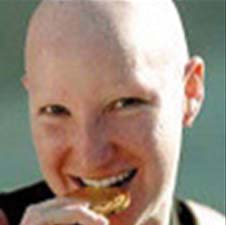
Two Fish in the Water
For swimming gold medalist Staciana Stitts-Winfield, love of the blue water began early on. “I started swimming before I walked,” she says. “My favorite part of swimming is the moment when you go underwater and all goes quiet.”
Competing since she was six years old, Stitts-Winfield says it took time for her aquatic skills to fully develop. “I was a very slow swimmer when I started out and slowly progressed,” she recalls. After being diagnosed with Alopecia Universalis, an auto-immune disorder that causes complete hair loss at age 12, instead of slowing down, Staciana redirected her focus and anger in the pool and as swimmers say, “started dropping time.”
In 1997, she made the Olympic Trials cut at the age of 16, making a 120-mile round trip trek to train with renowned Irvine Novas coach, Dave Salo, known for helping swimmer Amanda Beard qualify for the 1996 Atlanta Games. Stitts-Winfield trained for three years alongside Beard and others, before making the 2000 U.S. Olympic Swim Team for the Sydney Games. Her magic moment had finally arrived.
“I made the Olympic team by .001 of a second, the smallest margin to make it,” Stitts-Winfield says. “I was overwhelmed and shocked when I made it because it seemed like a very challenging goal to make. I was so relieved after working so hard and sacrificing so much, for so long.” During the Games, Stitts-Winfield held the advice of her coach close, “He said, after you finish a race, close your eyes and ask yourself if you did your best. If you did, be happy, no matter what the scoreboard,” she says. “That taught me the importance of effort versus outcome.”
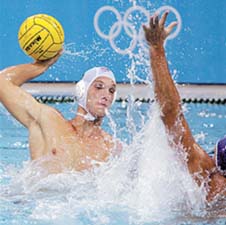
For Chris Segesman, becoming a fish in water didn’t begin until ninth grade. “I was a competitive swimmer from the age of five, but after learning the game, my focus was entirely water polo going forward.”
And go forward Chris did, all the way to the Olympic Games in Athens in 2004. “I truly believe my path to the Olympics was only paved because I had a strong support staff of coaches, family and friends. It wasn’t easy, says Segesman, who practiced eight hours each day and traveled on multiple 40+ day trips per year in preparation for the Games. “By the time the Olympics rolled around, I truly earned a chance to be named one of the Top 13. Getting selected was amazing.”
Although Segesman didn’t medal at the games, he asserts that just being a member of the team was worth its weight in gold, silver and bronze put together. “The first game I remember jumping in to get ready for the first whistle and I didn’t even feel the water. I could have played 40 games and never get tired.”
Second Career: Changing Positions
If it takes a village to raise a child, then it takes a country to raise an Olympian: a supportive team of coaches and athletic administrators behind the competitors who make it their life’s game plan to ensure they are positively pushed to limits they didn’t know they could reach.
Aside from being a part of the exclusive group of competitors known as Olympians, Gabe, Chris, Misty-May, Staciana and Michelle have another thing in common: they’re members of the Concordia University Irvine Master’s of Coaching and Athletics Administration team. Not only have they found the program to be beneficial for segueing into the second stage of their athletic careers, they are actively applying the lessons to their coaching roles, passing the knowledge along to their athletes and even potential employers.
“I was looking for a master’s degree that could relate to both my athletic administration work and coaching,” says Chris, who credits the program for influencing his current role as Associate Athletic Director of Mater Dei High School in Santa Ana. “It’s been a huge part of my development in the professional setting. I’ve been so impressed with the faculty, the knowledge I’ve gained and the connections as well.”
The largest program of its kind in the nation, the Master’s Degree in Coaching and Athletics Administration program at Concordia University Irvine remains the only program to offer strong practical training with a foundation in ethics and character building. That’s an aspect that Gabe Gardner appreciates.
“I’ve been around some of the best coaches in the world throughout my career. I’ve also been around a lot of not-so-good coaches, so I have the perspective to know when the messaging is on target and I’ve been very pleased with the program,” says Gabe, who served as the head volleyball coach at American River College in Sacramento in 2015.
Adds Gabe, “The program allowed me to organize and prepare a cohesive master’s thesis, whereby I can present everything in written form to a potential employer or future opportunity as it comes up.”
“It makes you ask, 'How do I want to be as a coach?'” says May-Treanor. “Because at the end of the day, it’s not about winning or losing. You want to leave a lasting footprint. I’ve been so happy with the program that I recommend it highly, especially to a lot of my colleagues who are players,” adds May-Treanor, who spends her time these days directing both the men’s and women’s volleyball program at Long Beach City College, as well as serving as head coach for its new women’s beach volleyball team.
For Staciana, a former assistant women’s swimming and diving coach at CUI, the program offered a way for her to achieve her goal of obtaining a master’s degree without feeling rushed. “The online aspect of it gave me the most flexibility to juggle working full-time, raising my daughter, and educating myself for a master's degree,” says Staciana.
Adds Staciana, “I loved the program because the professors engaged with the students. I also loved that I could choose electives that most interested me and apply it to my job daily.”
“I think the program is really well-suited to provide a message that I believe in, that I believe to be true of what great coaches and administrators look like to a broader marketplace of coaches,” says Gabe. “Whoever designed the program and implemented the messaging points, was really good. They’ve spoken a lot of the same truths that I’ve seen to be true already in my career, having been exposed to great coaches.”
“I compared some other programs and nothing quite fit the curriculum like Concordia," says Michelle, who ran the softball program at the University of Illinois at Chicago for eight years, before taking on her current role as head softball coach at Washington University in St. Louis. “I loved the Women in Sports class. It shows the history of how I have the ability to be head coach today and make a living doing that,” says Michelle. “The program is exactly what I want for being a coach and hopefully teacher-administrator.”
*Excerpts taken from Fall 2012 CUI Magazine article.